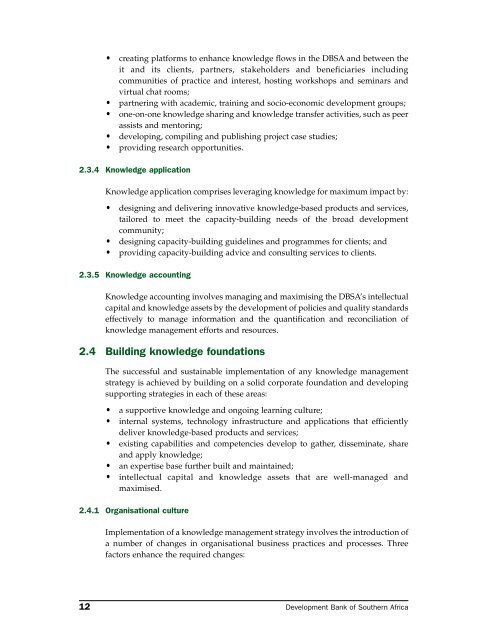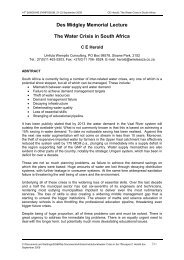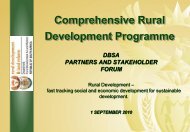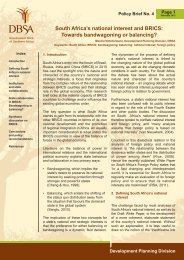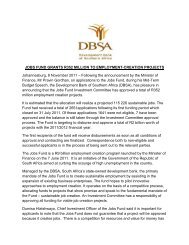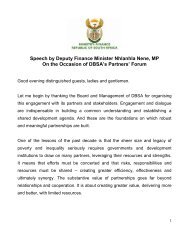A Knowledge Strategy
A Knowledge Strategy
A Knowledge Strategy
Create successful ePaper yourself
Turn your PDF publications into a flip-book with our unique Google optimized e-Paper software.
• creating platforms to enhance knowledge flows in the DBSA and between the<br />
it and its clients, partners, stakeholders and beneficiaries including<br />
communities of practice and interest, hosting workshops and seminars and<br />
virtual chat rooms;<br />
• partnering with academic, training and socio-economic development groups;<br />
• one-on-one knowledge sharing and knowledge transfer activities, such as peer<br />
assists and mentoring;<br />
• developing, compiling and publishing project case studies;<br />
• providing research opportunities.<br />
2.3.4 <strong>Knowledge</strong> application<br />
<strong>Knowledge</strong> application comprises leveraging knowledge for maximum impact by:<br />
• designing and delivering innovative knowledge-based products and services,<br />
tailored to meet the capacity-building needs of the broad development<br />
community;<br />
• designing capacity-building guidelines and programmes for clients; and<br />
• providing capacity-building advice and consulting services to clients.<br />
2.3.5 <strong>Knowledge</strong> accounting<br />
<strong>Knowledge</strong> accounting involves managing and maximising the DBSA’s intellectual<br />
capital and knowledge assets by the development of policies and quality standards<br />
effectively to manage information and the quantification and reconciliation of<br />
knowledge management efforts and resources.<br />
2.4 Building knowledge foundations<br />
The successful and sustainable implementation of any knowledge management<br />
strategy is achieved by building on a solid corporate foundation and developing<br />
supporting strategies in each of these areas:<br />
• a supportive knowledge and ongoing learning culture;<br />
• internal systems, technology infrastructure and applications that efficiently<br />
deliver knowledge-based products and services;<br />
• existing capabilities and competencies develop to gather, disseminate, share<br />
and apply knowledge;<br />
• an expertise base further built and maintained;<br />
• intellectual capital and knowledge assets that are well-managed and<br />
maximised.<br />
2.4.1 Organisational culture<br />
Implementation of a knowledge management strategy involves the introduction of<br />
a number of changes in organisational business practices and processes. Three<br />
factors enhance the required changes:<br />
12 Development Bank of Southern Africa


